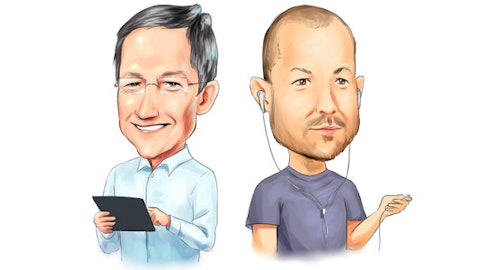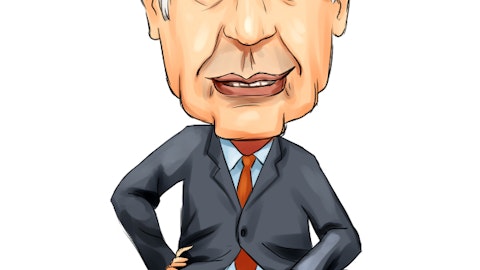Editor’s Note: Related tickers: BlackBerry Ltd (NASDAQ:BBRY), Nokia Corporation (ADR) (NYSE:NOK), Apple Inc. (NASDAQ:AAPL), JPMorgan Chase & Co. (NYSE:JPM), Google Inc (NASDAQ:GOOG)

BlackBerry Ltd (NASDAQ:BBRY) is expected to draw preliminary interest from technology companies, buyout firms and Canadian pension funds, but its fate may ultimately rest in the hands of its largest shareholder, Prem Watsa‘s Fairfax Financial Holdings Ltd. Any serious bidder would likely be hoping to get Watsa, the Fairfax founder and chairman who is often called Canada’s answer to billionaire U.S. investor Warren Buffett, on their side, because he could join in on a private equity deal or at the very least be the bellwether for broader investment sentiment.
BlackBerry’s largest shareholder ‘readies rescue bid’ (MobileToday)
Amid growing suggestions that rivals are cool about an acquisition of the Canadian company, largely because of opposition from the Canadian government to an overseas takeover, The Financial Times reported the company’s largest shareholder was prepping a rescue bid. Fairfax Financial’s Prem Watsa stepped down from the board of directors on Monday, when BlackBerry Ltd (NASDAQ:BBRY) announced it was effectively putting itself up for sale, to avoid any future conflict of interest. Watsa’s firm owns almost 10% of BlackBerry Ltd (NASDAQ:BBRY) and analysts claimed he was assembling a consortium to take control of the manufacturer. Peter Misek from Jefferies said: ‘We think Prem Watsa’s resignation from the board supports a possible LBO [leveraged buyout] scenario. We believe Fairfax along with other Canadian pension funds and banks are considering taking BlackBerry Ltd (NASDAQ:BBRY) private.’
BlackBerry is not Nokia. It still has unique and valuable assets (TheGlobeAndMail)
Top tech companies can implode in a hurry when their must-have gadgets are suddenly outclassed by a smart competitor or, worse, deemed unfashionable. It happened to Nokia Corporation (ADR) (NYSE:NOK), once the planet’s leading mobile phone company. In 2007, the year Apple Inc. (NASDAQ:AAPL) launched the iPhone, Nokia Corporation (ADR) (NYSE:NOK) shares traded as high as $40 (U.S.). Last year, they hit a low of $2 (the shares are up by a third this year). Nokia Corporation (ADR) (NYSE:NOK)’s Canadian CEO and would-be rescuer, Stephen Elop, compared the company to a “burning platform” and recruited Microsoft to douse the flames. It hasn’t worked. Nokia Corporation (ADR) (NYSE:NOK) phones, with their Microsoft operating systems, have been torched by the iPhones and rival Android models milled out by Samsung and other tech giants.
Will BlackBerry survive? (CNBC)
BlackBerry Said to Have Sought Buyers Since 2012 (BusinessWeek)
BlackBerry Ltd (NASDAQ:BBRY)’s announcement that it will consider takeover bids followed almost a year of advisers unsuccessfully canvassing potential buyers in search of a deal, two people with knowledge of the matter said. In recent months, as BlackBerry Ltd (NASDAQ:BBRY) sales and subscriber numbers deteriorated, bankers from JPMorgan Chase & Co. (NYSE:JPM) and RBC Capital Markets quietly contacted possible bidders and found little interest in buying the whole company, especially among private-equity firms, said the people, who asked not to be named because the talks were private.
Why BlackBerry should abandon the smartphone market (Wired)
BlackBerry Ltd (NASDAQ:BBRY) has been dying for a while, but its recent throes are particularly hard to ignore. The company that pioneered the transformation of mobile phones into internet devices announced on 12 August it might sell itself or enter a joint venture, a tacit admission that better smartphones from Apple Inc. (NASDAQ:AAPL) and Google Inc (NASDAQ:GOOG) have left the company cornered and bloodied. The Waterloo, Canada company has already been though a slew of failed turnaround efforts focused on its tablets and smartphones, including pivoting around a lean, UNIX-like operating system called QNX, which was acquired 2010.





